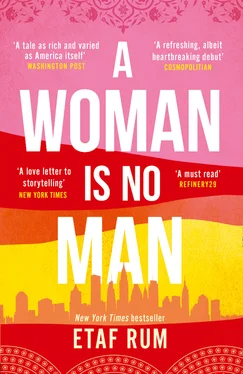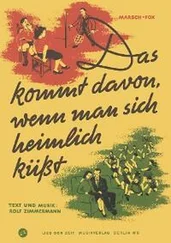“We live in Bay Ridge,” Adam said as the cabdriver stopped beside a row of old brick houses. Isra, Fareeda, and Sarah stood on the sidewalk while the men unloaded the suitcases. Adam held Isra’s suitcase in one hand and gestured around the block with the other. “Many of the Arabs in New York live in this neighborhood,” he said. “You’ll feel right at home.”
Isra surveyed the block. Adam’s family lived on a long, tree-lined street with row houses stacked against one another like books on a shelf. Most of the homes were made of red brick and curved in the front. They had two stories and a basement, with a short, narrow staircase leading to the front door on the first floor. Iron gates separated the houses from the sidewalk. It was a well-kept neighborhood—there were no open gutters or garbage littering the street, and the roads were paved, not dirt. But there was hardly any greenery—only a row of London planes lining the walk. No fruit to pick, no balcony, no front yard. She hoped there was at least a backyard.
“This is it,” Adam said when they reached the front gate of a house numbered 545.
Adam opened the front door and led her inside. “The houses here are quite cramped,” he said as they walked down the hall. Isra silently agreed. She could see the entire first floor from the hall. There was a sala to her left, and farther down, a kitchen. To her right was a stairway leading to the second floor, and behind it, almost hidden, a bedroom.
Isra looked around the living room. Though it was much smaller than her parents’ sala back home, it was decorated as though it were a mansion. The floor was covered with a Turkish rug, crimson with a gold pattern in the center. The same pattern was on the burgundy couches, the red throw pillows, and the long, thick curtains lining the windows. A worn leather sofa sat in the corner of the room, as though forgotten, with a shiny gold vase nestled beside it.
“Do you like it?” Adam asked.
“It’s beautiful.”
“I know it’s not bright and airy like the houses back home.” His eyes settled on the windows, which were hidden behind the curtains. “But this is how things are here, what can we do?”
There was something in his voice, and Isra found herself thinking of the day on the balcony, the way his eyes had chased the grapevines, taking in the open scenery. She wondered whether he longed to return to Palestine, whether he wanted to move back home one day.
“Do you miss home?” The sound of her voice startled her, and she dropped her eyes to the floor.
“Yes,” Adam said. “I do.”
Isra looked up to see that he was still staring at the curtains. “Would you ever move back?” she asked.
“Maybe one day,” he said. “If things got better.” He turned away and walked down the hall. Isra followed.
“My parents stay here on the first floor,” Adam said, pointing to the bedroom. “Sarah and my brothers sleep upstairs.”
“Where will we stay?” she asked, hoping her bedroom had a window.
He pointed to a closed door down the hallway. “Downstairs.”
Adam opened the door and signaled her to go down. She did, all the while wondering how they could live in a basement. If there was barely enough light upstairs, what would the basement be like? She peered down the shallow steps. At once, she was overwhelmed with darkness. She put both hands in front of her and descended, the light cast from the doorway fading with each step. She reached the bottom of the stairs and fumbled against the wall in search of a light switch. Cold crept through her fingertips until she found it and flicked it on.
A large, gold mirror hung on the wall directly in front of her. It seemed odd that anyone should place a mirror in such a dreary, uninhabited place. What good was a mirror in the middle of the dark with no light to reflect?
She entered the first room of the basement, surveying the dim space. The room was narrow and empty—four gray walls, bare with the exception of a window to her left and, in the center of the wall ahead, a closed door. Isra opened it to find another room, slightly larger than the first and furnished with a queen-size bed, a small dresser, and a large mirror. Beside the mirror was a small closet, and beside that, a doorway that led to a bathroom. This would be their bedroom, Isra knew. It didn’t have any windows.
She studied her reflection in the mirror. Her face looked dull and gray in the fluorescent light, and she stared at her small, weak frame. She saw a girl who should’ve kicked and screamed as her mother tightened her wedding gown, should’ve begged and hollered as her father secured her in the taxicab to the airport. But she was a coward. She turned away. This is the only familiar face I’ll ever see again, Isra thought. And she couldn’t stand the sight of it.
Upstairs, the earthy smell of sage filled the kitchen. Fareeda was brewing a kettle of chai. She stood over the stove, back hunched, staring absently at the steam. Watching her, Isra found herself thinking of the maramiya plant in her mother’s garden, how Mama would cut off a few leaves every morning to brew in their chai because it helped with Yacob’s indigestion. Isra wondered if Fareeda grew a maramiya plant, too, or if she used dried sage from the market instead.
“Can I help you with something, hamati ?” Isra asked as she walked over to the stove. It was the first time she had called Fareeda mother-in-law.
“No, no, no,” Fareeda said, shaking her head. “Don’t call me hamati . Call me Fareeda.”
Growing up, Isra had never heard a married woman called by her first name. Her mother was always referred to as Umm Waleed, mother of her eldest son Waleed, and never Sawsan. Even her aunt Widad, who had never borne a son, was not called by her first name. People called her Mart Jamal, Jamal’s wife.
“I don’t like that word,” Fareeda said, reading the confusion on her face. “It makes me feel old.”
Isra smiled, resting her eyes on the boiling tea.
“Why don’t you set the sufra ?” Fareeda said. “I’m making us something to eat.”
“Where’s Adam?”
“He left for work.”
“Oh.” Isra had expected him to stay home today, to take her for a walk around the neighborhood perhaps, introduce her to Brooklyn. Who went to work the day after his wedding?
“He had to run an errand for his father,” Fareeda said. “He’ll be home soon.”
Why couldn’t his brothers run the errand instead? Isra wanted to ask, but she was afraid of saying the wrong thing. She cleared her throat and said, “Did Omar and Ali go with him?”
“I have no idea where they went,” Fareeda said. “Boys are a handful, going and coming as they please. They’re not like girls. You can’t control them.” She handed Isra a stack of plates. “I’m sure you know—you have brothers.”
Isra smiled weakly. “I do.”
“Sarah!” Fareeda called out.
Sarah was upstairs in her bedroom. “Yes, Mama?” she called back.
“Come down here and help Isra set the sufra !” Fareeda said. She turned to Isra. “I don’t want her thinking she’s excused from her chores now that you’re here. That’s how trouble starts.”
“Does she have a lot of chores?” Isra asked.
“Of course,” Fareeda said, looking up to find Sarah at the doorway. “She’s eleven years old, practically a woman. Why, when I was her age, my mother didn’t even have to lift a finger. I was rolling pots of stuffed grape leaves and kneading dough for the entire family.”
“That’s because you didn’t go to school, Mama,” Sarah said. “You had time to do those things. I have homework to catch up on.”
“Your homework can wait,” Fareeda said, handing her the ibrik of chai. “Pour some tea and hurry.”
Читать дальше












